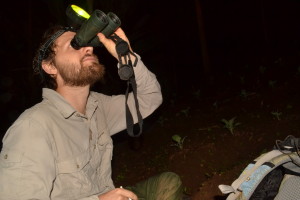 When I tell people back home that I study primates, they often think I work in a lab, administrating some experimental drug on chimpanzees. When I tell them I work in conservation, they think I spend my time in flip-flops wandering through forests glassy eyed staring at tree frogs. There is approval in most people’s eyes with the lab scenario, and mocking amusement in their faces with the latter. I think there’s a problem there – we associate success, wealth, a ‘proper’ job with machinery, making something, building bridges, roads, cars, selling products, transporting goods, managing, infrastructure, steel, concrete, packaging, forklifts, hardhats and hi-vis vests. Lab coats fits in their somewhere too. To be successful, we show the world around us the trappings of success; a house, a car, a nice sofa, an amazon prime account, our kids going to a nice school… There’s nothing wrong with this. In England at least, we’re taught from a very early age that these are important things, there what make you a real member of a society, integrate you, that they make you a real person. But conservation doesn’t fit in there. It’s not important. It’s probably something that happens very far away… Well, generally it is.
When I tell people back home that I study primates, they often think I work in a lab, administrating some experimental drug on chimpanzees. When I tell them I work in conservation, they think I spend my time in flip-flops wandering through forests glassy eyed staring at tree frogs. There is approval in most people’s eyes with the lab scenario, and mocking amusement in their faces with the latter. I think there’s a problem there – we associate success, wealth, a ‘proper’ job with machinery, making something, building bridges, roads, cars, selling products, transporting goods, managing, infrastructure, steel, concrete, packaging, forklifts, hardhats and hi-vis vests. Lab coats fits in their somewhere too. To be successful, we show the world around us the trappings of success; a house, a car, a nice sofa, an amazon prime account, our kids going to a nice school… There’s nothing wrong with this. In England at least, we’re taught from a very early age that these are important things, there what make you a real member of a society, integrate you, that they make you a real person. But conservation doesn’t fit in there. It’s not important. It’s probably something that happens very far away… Well, generally it is.
Through a few centuries of civilization, half a dozen major invasions, and a few wars, the UK has been stripped of nearly every natural resource above ground. With this, wildlife has been almost completely removed. We once had bears. Fricking BEARS. Now we have to fight to save badgers. Not that badgers aren’t nice, it’s just a sorry state of affairs that we’ve sunk to these levels. But for all our growth, modernism and high-speed broadband, is the UK happier than anywhere else? Are we superior to the likes of Peru or Sumatra or Chad? If a nation’s success is measured in machinery and hard-hats and the time it takes to receive a pizza delivery, then yes, but if it’s to be measured in closeness to nature or ecological wealth … i.e the possibility of surviving the next few hundred years… then no, in old Blighty we’re scraping the bottom of the barrel.
With all this modernism, all these shopping centers, what are we aiming to achieve? Sometimes I feel like the only purpose of the entire race is to reach a comfortable level of sterility where all obstacles (in the form of wildlife and pesky forests) are removed to make way for more supermarkets and discount sports stores. To some extent, I understand this. Forests and wildlife are dirty and smelly. They’re nice to look at once in a while with a fence around them, but what purpose do they serve? Well, they serve a pretty big one. Carbon stocks in tropical forests trap the carbon dioxide we pour into the atmosphere and turn it into nice, breathable oxygen. If they’re chopped down and burnt to make way for crops or palm oil or cattle, then not only does the possibility of storing CO2 emissions decrease, but whilst being burnt, those forests release more CO2 into the atmosphere, contributing to the warming of the planet. But what about the wildlife within those forests? Well, they’re the gears which drive those forests and keep them working. Without seed dispersal and predators, the ecosystems which keep those forests functioning break down.
What point am I trying to get at? Well, as I write this I’m sitting in the office of The Little Fireface Project in West Java. I’m surrounded by people who’ve forgone the trappings of success to try and save some wildlife, and in turn save some forests. Lorises serve an important ecological function. By raising awareness in the local people through conservation education, maybe they might think twice before chopping down some forests for crops, or not take lorsies to sell as pets. By conducting non-invasive research on lorises, LFP raises awareness internationally about these amazing creatures, and maybe a palm oil company or a government with think twice before creating a plantation or constructing a road. My little project whilst I’m here is to reintroduce a loris that was caught for the pet-trade to his natural habitat. Not only will this give him a better life, living as a wild, free animal as he was meant to be, but we’ll also raise awareness about conservation and lorises with the local people. It is, admittedly, just a drop in the bucket when faced with that terrifying figure of 1.5 hectares of tropical forest destruction every second, but with projects like this one happening all over the world, and people like you reading blogs like this one, maybe the Little Fireface Project can make a difference.
Chris D Marsh
